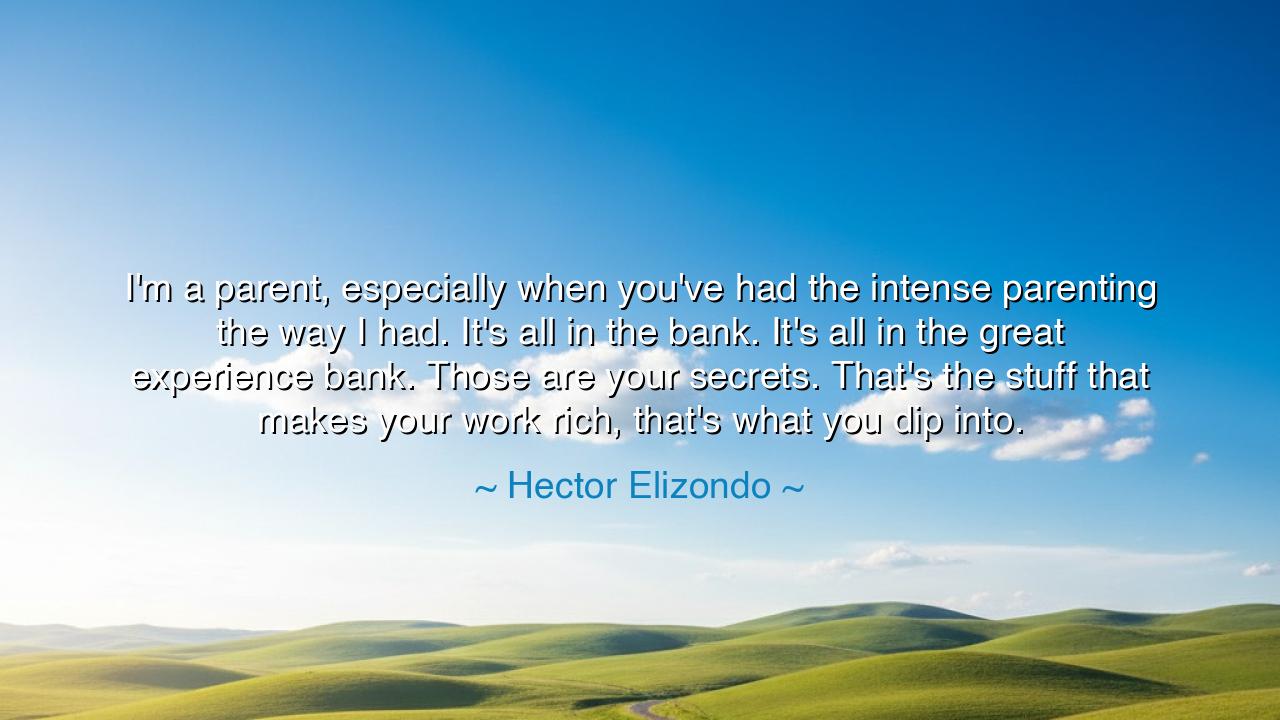
I'm a parent, especially when you've had the intense parenting
I'm a parent, especially when you've had the intense parenting the way I had. It's all in the bank. It's all in the great experience bank. Those are your secrets. That's the stuff that makes your work rich, that's what you dip into.






Hear the words of Hector Elizondo, who speaks with the weight of a life lived deeply: “I’m a parent, especially when you’ve had the intense parenting the way I had. It’s all in the bank. It’s all in the great experience bank. Those are your secrets. That’s the stuff that makes your work rich, that’s what you dip into.” In this reflection, he reveals the eternal truth that nothing is wasted—not joy, not hardship, not the fire of discipline nor the tenderness of love. All of it, the whole of parenting experienced, becomes treasure stored in the vault of the soul. From this vault, the parent, the artist, the worker, the human being, may draw strength and depth, transforming memory into wisdom and pain into richness.
The ancients understood this principle well. They spoke of memory as the treasury of the heart, the place where one gathered both sweetness and sorrow, and from which one could bring forth meaning in times of need. Elizondo calls this the “experience bank”—a storehouse not of coins or gold, but of lived life. When he speaks of “intense parenting,” he is naming the struggles, demands, and deep impressions left upon him by his upbringing. Whether gentle or strict, joyful or difficult, those experiences became the raw material of his own character, and later, the wellspring of his work as an actor, a man, and a father.
Consider the example of the great writer Leo Tolstoy. His early years were marked by the death of his parents and the stern, often confusing guardianship of relatives. From this intense parenting, both nurturing and neglectful, he drew the emotional soil that later bloomed into masterpieces like Anna Karenina and War and Peace. His novels were not fantasies spun from nothing, but truths drawn from his experience bank—observations of family, loss, and love etched into his soul. Like Elizondo, Tolstoy shows us that the richness of one’s craft is born not from ease, but from the layered and sometimes painful realities of life.
Elizondo also speaks to a truth about the continuity of generations: that the secrets of parenting are passed down not only through deliberate teaching, but through the silent shaping of the soul. What a child experiences—whether encouragement or correction, whether patience or impatience—becomes part of their hidden reservoir, influencing the way they love, work, and create. Thus, what parents pour into their children does not vanish; it is stored. It may be drawn upon years later, even in ways the parent could never predict.
Yet his words are not merely nostalgic—they are also practical. He reminds us that when the well of inspiration runs dry, when the world demands authenticity, the truest source we can turn to is not imitation of others, but our own experience bank. It is there, in the memory of a parent’s embrace or a parent’s stern rebuke, in the laughter at a family table or the silence of disappointment, that we find the truths which make our work—whether art, craft, or love—resonate with life.
The lesson, then, is clear: cherish and honor your experiences, even the hard ones. Do not despise the intensity of your upbringing, nor the difficulties of parenting you now face. All of it is being written into your bank, stored away as wealth more enduring than gold. Someday you will draw upon it—to comfort your child, to strengthen your craft, to guide a friend, or to inspire a stranger. Nothing is wasted if you choose to use it.
Therefore, let every parent and every child who hears these words take action: live with awareness, knowing that everything you endure and everything you give becomes part of the eternal bank of memory and wisdom. When you parent, you are depositing into your child’s future reservoir. When you struggle, you are filling your own. And when the time comes to act, to create, or to teach, you may reach into that treasury and find it overflowing.
Thus Hector Elizondo’s words, born from reflection, carry the wisdom of the ancients: life itself is the bank, and parenting is one of its greatest deposits. To honor what has been stored, to draw upon it with humility, and to pass it forward in richness—this is how one turns ordinary life into eternal treasure.






AAdministratorAdministrator
Welcome, honored guests. Please leave a comment, we will respond soon